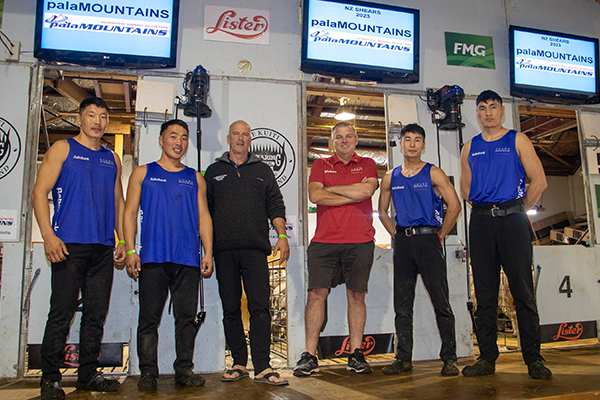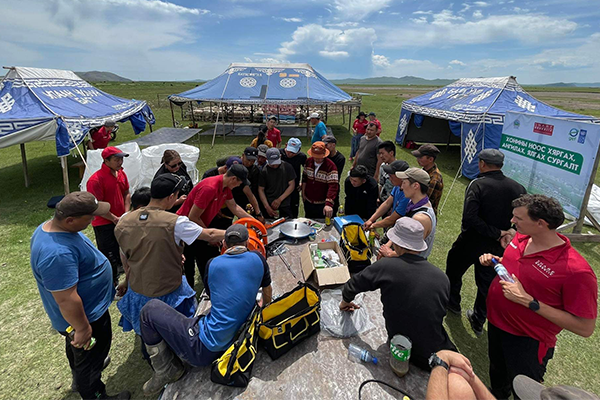Kiwi touring party sharpens Mongolian herders’ machine shearing skills
The machine shearing skills of more than 100 Mongolian herders have recently been greatly advanced, following a five-week visit from a New Zealand touring party which ran shearing training courses and demonstration events in several locations across Mongolia.
The trip was undertaken as part of the Share Mongolia Programme – an initiative set up in 2020 to introduce modern shearing techniques and equipment into Mongolia. As part of the Programme, shearing training courses in Mongolia were first trialled last year while four Mongolian herders also recently spent three months in New Zealand where they worked as part of shearing gangs across the country.
Rabobank agribusiness manager Paul Brough – who played a lead role in the formation of the programme – said the 12-strong touring party was made up of a mix of Rabobank staff and farmers from across New Zealand.
“The group included members from the Waikato, King Country, Taranaki, Marlborough and South Canterbury regions, with all attendees having significant shearing experience,” he said.
“About half of us attended the inaugural training (in Mongolia) last year, with the other half making their first trip.”

Rabobank agribusiness manager Paul Brough (3rd from right), Share Mongolia representative Mark Barrowcliffe (3rd from left) and the four Mongolian herders at the NZ shearing champs earlier this year.
The latest round of shearing training took place between 10 June and 15 July and was funded by the United Nations, the NZ embassy in Beijing and the Rabobank Community Fund.
Seven courses across seven different provinces
To reach as many herders and as many regions as possible, Mr Brough said, the team split up into three groups to deliver the training.
“Across the five weeks, we were able to deliver seven five-day training courses to a total of 112 Mongolian herders across seven different provinces,” he said.
“The majority of the herders taking part in the courses had little or no experience with machine shears having previously done their shearing with scissors. But they picked up the skills using the electronic handpiece really well, and by the end of the course, most were able to shear a sheep in around five minutes which was a lot quicker than the 25 minutes they were taking at the start.
“There was a good mix of ages across the courses, with some of the herders returning for their second year of training, and several women also participating.”
Mr Brough said course participants in each area have been left with five shearing machines and a grinder so they could put their new skills into practice.
“These are usually left with a local co-op to share among the participants as they see fit,” he said.
“It’s a start, but it’s not really enough equipment for everyone, and they’re already screaming out for more of these as they all want to use them at the same time.
“As a result, we’re aiming to try and raise more funding so we can supply more equipment to them in the months ahead.”
While in Mongolia delivering the training, Mr Brough said, the New Zealand touring party lived with local herders, sleeping in gers (local small tent like dwellings) and enjoying local food.
“The team got to learn a lot about the local culture and traditions including taking part in the Naadam festivals – the biggest holiday in Mongolia which is held to celebrate their freedom and unity as a country,” he said.
“Although challenging at times with long distances to travel and very basic living conditions, the feedback from the attendees has been really positive and they’ve all said it was an incredible experience.”
Huge potential for Mongolian wool industry
Mr Brough said the Mongolian wool industry held huge potential with a recent Unido (United Nations Industrial Development Organisation) report finding that up to 4,000 jobs could be created in Mongolia by machine shearing, and that 9,000 tons of Mongolian wool is wasted each year due to limited resources and capacity.
“Nearly 45 per cent of the 67 million livestock in Mongolia are sheep, estimated to be around 30 million head, with the ability to produce about 30,000 – 35,000 tons of wool annually,” he said.
“There are more sheep in Mongolia than any other animal which means there is huge scope for improving economic income by sharing the knowledge and expertise of New Zealand farmers with Mongolian herders.
“As a result, there are a lot of different government agencies in Mongolia trying to promote wool, and, in addition to the training courses, we were also lined us up to attend some demonstration events – including one that was done in the Gobi Desert.
“At these we showed the locals how to shear, and all the events drew really good crowds.”
Mr Brough said the Share Mongolia Programme was now attracting the interest of overseas companies keen to source Mongolian wool.
“We’ve had a few international carpet manufacturers taking an interest. And we’ve also had a pharmaceutical group from Europe get in touch and ask us to help source Mongolian wool,” he said.
“They want Mongolian wool but haven’t been able to source good quality, so they approached the Share Mongolia Programme and we’re now helping out with that.”
Local help
Mr Brough said the touring party was joined on their travels by the four Mongolian herders who visited New Zealand earlier in the year, and who took on the role of assistant trainers on the latest round of training courses.
“It was great to see Budee, Baaska, Ama and Khanda again and to have them help with the training. They also played a key role in reducing the impacts of the language barrier,” he said.
“At this stage, they need someone with a bit more experience to guide them through the training, but with a bit more time, the plan is to have them running the courses by themselves.”
It was also hugely rewarding, Mr Brough said, to spend time with the Mongolian shearers and to hear how their trip to New Zealand has impacted their lives.
“I got to know them pretty well while they were in New Zealand, so it was really cool to see where they live and to spend a couple of nights with them and their families,” he said.
“The new skills and money they acquired during their trip to New Zealand have had a huge impact on their lives and they are now wealthy people by local standards.
“Two of them have started a commercial shearing business together utilising one of the mobile shearing trailers we set them up with, while the other two are also working as shearers in their local regions.
“They’re all shearing up to 200 sheep a day, as opposed to the 25 sheep a day they were shearing prior to their NZ visit, and this obviously makes a massive difference to the income they can generate.”
Mr Brough said another benefit of their improved skills was that the group were now shearing lambs.
“Previously it was never worth doing this. But because they can do them a bit quicker, it’s now economically viable, which is a bit of a bonus.”
Future Programme plans
Mr Brough said there was strong demand for future training courses and planning is already under way for courses in 2024 which might also be expanded to cover off other topics including wool handling, pressing, and other animal health practises such as sheep dipping.
“A lot of the herders who attended the courses are also very keen to come to New Zealand for a stint working here,” he said.
“At least three of the herders that came out earlier this year have said they’d like to return and, if we can raise the funding, it’s possible we could have up to 10 herders heading over this way early next year.”

The Share Mongolia team during their recent visit to Mongolia
Rabobank New Zealand is a part of the global Rabobank Group, the world’s leading specialist in food and agribusiness banking. Rabobank has more than 120 years’ experience providing customised banking and finance solutions to businesses involved in all aspects of food and agribusiness. Rabobank is structured as a cooperative and operates in 40 countries, servicing the needs of about 10 million clients worldwide through a network of close to 1000 offices and branches. Rabobank New Zealand is one of the country's leading agricultural lenders and a significant provider of business and corporate banking and financial services to the New Zealand food and agribusiness sector. The bank has 32 offices throughout New Zealand.
Media contacts:
David Johnston
Media Relations Manager
Rabobank New Zealand
Phone: 04 819 2711 or 027 477 8153
Email: david.johnston@rabobank.com
Denise Shaw
Head of Media Relations
Rabobank Australia & New Zealand
Phone: +612 8115 2744 or +61 2 439 603 525
Email: denise.shaw@rabobank.com
